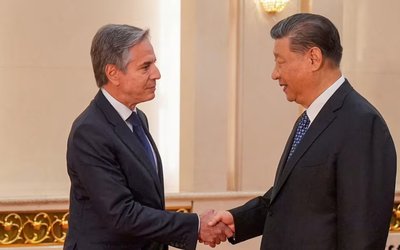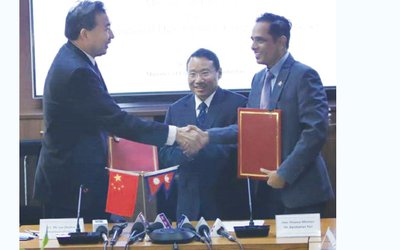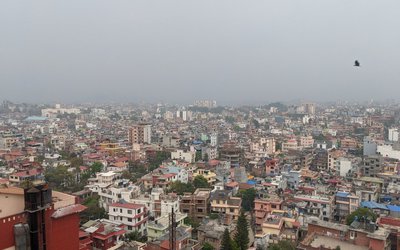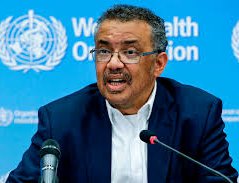
So far, it's been difficult to judge whether the focus on the coronavirus pandemic has meant that other global health issues are being sidelined at the World Health Organization (WHO).
But there's an even greater likelihood of this happening if the United States stops paying its contributions to the WHO, a move announced by Washington last month. In the agency's two-year funding period for 2018-2019, the US membership fee and voluntary contributions added up to around $893 million (€818 million) — more than 14% of its budget.
The US — specifically, President Donald Trump — has claimed that the WHO is too nice to China and too critical of the US, that China has too much influence within the organization and that the WHO was too slow to respond to the pandemic. This despite the fact that Trump himself has continuously played down both the extent of the pandemic and the danger posed by COVID-19.
But as Suerie Moon, co-director of the Global Health Center at Geneva's Graduate Institute explained, it's not yet clear exactly what Trump meant by his announcement. Is the US no longer prepared to pay the WHO's fixed membership fee, which is calculated on the basis of economic performance and population size? Does Washington intend to stop making voluntary contributions? In recent years, these have made up around 75% of its total payments. And when would these changes come into effect?
Rethinking US support
This past weekend the Trump administration appeared to backpedal slightly on its stance, which Moon attributes to the fact that Trump's harsh criticism has caused it to lose influence on the international stage. Broadcaster Fox News ran a report on a letter drafted by the government, saying it was prepared to pay a fixed membership fee equal to China's contribution. In 2020, this has been calculated at $57.4 million (€52.6 million).
Later, Trump tweeted that several concepts were under discussion, including one that would see the US pay 10% of its previous payments. Based on its membership fees for the years 2018 and 2019, that figure would amount to roughly $44.7 million.
The fact is, as of April 30, neither the US nor China had paid their WHO membership fees for 2020, which were due on January 1. This, however, is a recurring problem for the organization: Germany, for example, has so far only paid half of its yearly fee. Unlike China, however, the US is also behind with fees from previous years.
Funding cut 'extremely shortsighted'
The US decision to cut funding could have wide-ranging consequences, said Moon, using as example the global fight against polio. This is a key issue for Washington, which has in the past consistently supported the initiative with its voluntary contributions. If these contributions are cut, Moon expects projects — such as those in which people go door-to-door to vaccinate children against polio — will suffer the consequences.
"Oftentimes the polio surveillance system is the same system that's being used to detect outbreaks of other kinds of infectious disease," she said. "These facilities are not only dedicated to polio; they can be quickly repurposed to help detect, for example, cases of COVID-19." In this light, she called the US decision to suspend WHO payments "extremely shortsighted and extremely dangerous."
WHO, medical experts regret US funding freeze
Moon doesn't think the US criticism of the WHO's attitude toward China during the pandemic is justified. She stressed that the agency had to act very cautiously in its handling of the issue, with pandemic being a highly sensitive political topic for China.
"The most important task they [WHO] had was to secure the cooperation of the Chinese government, and also to make sure that the government was sharing as much information as possible," she said. It's no coincidence that China refused access to a team of experts from the United States, whereas a WHO team was the first to be allowed into the country in mid-February.
Pandemic a wake-up call
For Thomas des Garets Geddes, a research associate at the China-focused Mercator Institute for China Studies in Berlin, the diplomatic aspect doesn't justify the WHO director-general singling out China's response to the pandemic as being very positive. Speaking with DW, Geddes said that "such excessive and partly misleading praise was unnecessary and wrong."Moon, however, believes this response reveals one of the WHO's fundamental problems. "The organization cannot really risk offending its funders. It's not able to be as vocal or as critical as sometimes we may need the WHO to be," she said.
"What this pandemic has done is really woken up the world to what a huge threat a virus can pose — a security threat, an economic threat, not just a health threat," said Moon. "And [it has shown] the critical importance of having an organization that is reliable, stable, supported, one that has enough political leeway to be vocal and critical of its member states when it needs to be."
WHO General Assembly Starts Amid Pandemic
The annual assembly of the World Health Organization has started, and is being held by video conference amid the coronavirus pandemic.
Representatives of the 194 member countries are taking part in the two-day online meeting. Key issues include developing a vaccine for the coronavirus and international coordination to distribute medical supplies.
WHO Director-General Tedros Adhanom Ghebreyesus said that the risk remains high, and they have a long road to travel.
The United States has accused the WHO of being too supportive of China. Washington is demanding a detailed investigation into the organization's initial response to the outbreak.
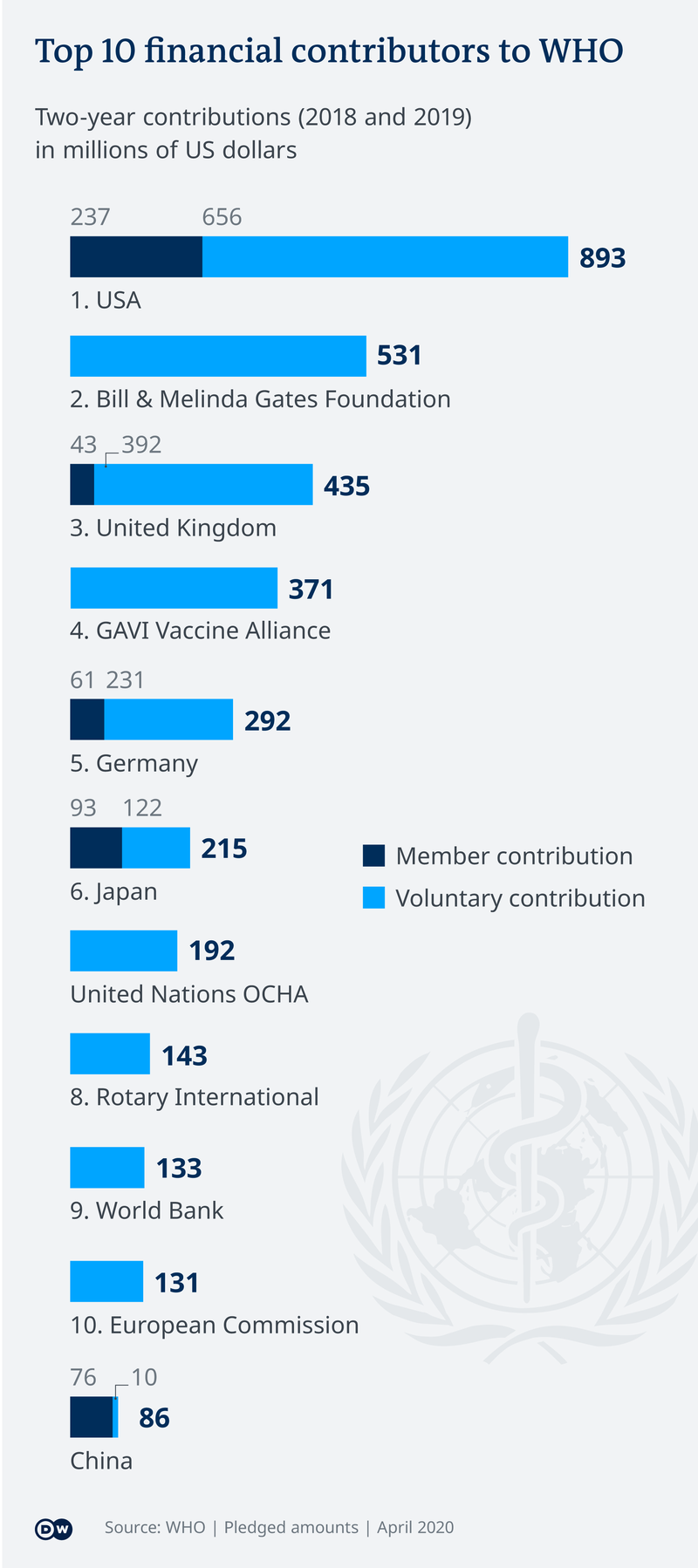
Chinese President Xi Jinping gave a speech at the opening ceremony. He defended his country's handling of the crisis.
"All along, we have acted with openness, transparency and responsibility," Xi said. "We have provided information to the WHO and relevant countries in a most timely manner."
Xi pledged 2 billion dollars over two years to help developing countries combat the coronavirus.
A hot-button issue ahead of the meeting was whether to let Taiwan take part as an observer.
Taiwanese authorities said they didn't receive an invitation. The assembly's chairperson said the matter will be discussed at another meeting later this year.
Taiwan's Foreign Minister Joseph Wu expressed "deep regret and strong dissatisfaction that the WHO Secretariat has yielded to pressure from the Chinese government and continues to disregard the right to health of the 23 million people of Taiwan."
The confrontation between the US and China is expected to become even more pronounced at the meeting. The friction throws doubt on whether WHO members can unite to contain the virus.
Source: DW
- Weather Forecast: Partly Cloudy In Bagmati And Koshi Province
- Apr 27, 2024
- Three-Day Global Science-Policy Forum: Socially Inclusive Solar Irrigation Systems Concluded
- Apr 26, 2024
- Nepal And China Ink Two Agreements , PM Prachanda Meets Chinese Delegation
- Apr 26, 2024
- Nepal Army Held National Cyber Security Symposium
- Apr 26, 2024
- Nepal’s Investment Landscape Revitalize By Nine Ordinances: FNCCI President Dhakal
- Apr 26, 2024

